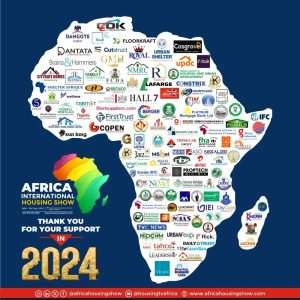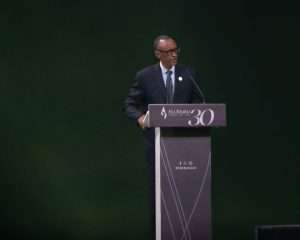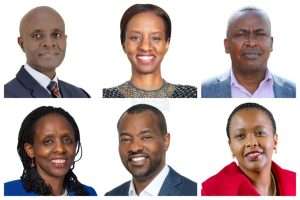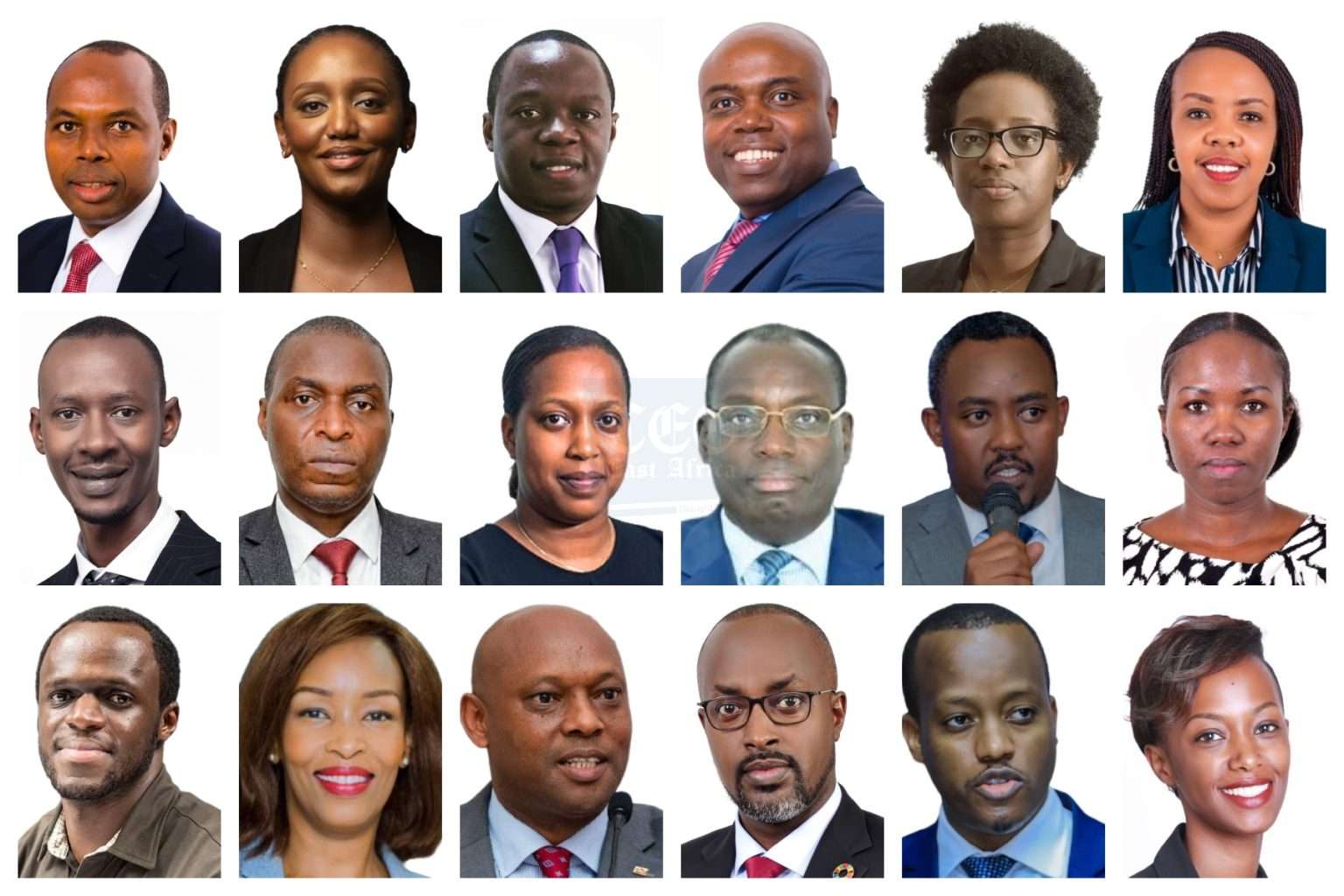This April, Rwandans in Rwanda and the world over commemorate 30 years (Kwibuka30) after the ghastly genocide in which more than 1,000,000 Tutsi, were killed.
But like the Rwandan President Paul Kagame, remarked at the Kwibuka30, this year’s commemoration is a mix of both “grief and gratitude in equal measure”.
“We remember our dead and are also grateful for what Rwanda has become,” Kagame told friends of Rwanda at the ceremony held at the Kigali Genocide Memorial, in Kigali, Rwanda, on Sunday, April 7, 2024.
The genocide began on April 7th 1994.
The East African nation, under the leadership of Kagame, has picked up the pieces and is rebuilding itself steadily.
For example in these 30 years, the country’s GDP has grown by 18 times or 1664.9% from USD753.6 million in 1994 to USD13.3 billion at the end of 2022, according to World Bank figures. GDP per capita has grown 9 times or 763.4% from USD111.9 to USD966.2 in the same period.

According to the African Development Bank Group 2024, Macroeconomic Performance and Outlook (MEO) released in February 2024, Rwanda, at 7.2% growth projections is among the world’s 20 fastest-growing economies this year.
According to the 22nd edition of the Rwanda Economic Update (REU), this growth momentum is expected to continue through to 2026, on the back of anticipated recovery in global tourism, new construction projects, and increased manufacturing activities.
“Our journey has been long and tough. Rwanda was completely humbled by the magnitude of our loss, and the lessons we learned are engraved in blood. But the tremendous progress of our country is plain to see, and it is the result of the choices we made together to resurrect our nation,” Kagame said at Kwibuka 30.
Kwibuka is a Kinyarwanda word for remembering.
Kagame added that his transformation has been accelerated by being intentional about national unity as well as “reversing the arrow of accountability, which used to point outwards, beyond our borders”.
“Now, we are accountable to each other, above all. Most importantly, we chose to think beyond the horizon of tragedy and become a people with a future”.

Rwanda’s President Paul Kagame speaks at this year’s Kwibuka30 ceremony held at the Kigali Genocide Memorial, in Kigali, Rwanda, on Sunday, April 7, 2024. He extolled a Rwanda that has learnt from its sad past and is now banking on its people, especially its young men and women to “renew and redeem a nation after a genocide”.
Kagame said this tremendous progress and the future it heralds, is built on “a new generation of young people” with the “ability to renew and redeem a nation after a genocide”.
“Our job was to provide the space and the tools for them to break the cycle. And they have,” Kagame reiterated.
The rise of the home-grown Rwandan CEOs fixing Rwanda
While the role of an accountable and results-oriented government in this remarkable transformation story is well told and abundant for all to see, one of the other forces that have emerged, especially over the last decade is the inexorable rise of a fast-growing pool of homegrown chief executives. They are young⏤ most of them between 35 and 50 years; well-educated and skilled and with global exposure and a never-again passion for their country.
They can be found everywhere, home and away⏤ leading government agencies and parastatals, homegrown private companies as well as subsidiaries of regional and global multinationals as well as in the non-profit sectors.
In the government agencies and government-owned companies space for example, there is Francis Gatare, the CEO of Rwanda Development Board (RDB), a government institution, mandated to accelerate Rwanda’s economic development by enabling private sector growth. There is also Regis Rugemanshuro, the CEO of Rwanda Social Security Board (RSSB) with USD1billion+ in assets under management.
Yvonne Manzi Makolo, leads RwandAir, the national airline while Nick Barigye, is the CEO of the Kigali International Financial Centre (KIFC), an ecosystem of financial actors seeking to transform Rwanda into an international financial destination for investors seeking opportunities across the African continent. Cleophas Barore leads the Rwanda Broadcasting Agency (RBA), the national broadcaster, while Kampeta Pitchette Sayinzoga leads the Development Bank of Rwanda (BRD). At the helm of the Agaciro Development Fund, Rwanda’s sovereign wealth fund is Tesi Rusagara, while Grace Nishimwe, is the Director General & Chief Registrar of Land Titles at the National Land Authority.
In the private sector, there is Dr. Diane Karusisi, the CEO of Bank of Kigali, the largest commercial bank in Rwanda by assets; Lina Mukashyaka Higiro, the CEO of NCBA Rwanda, a subsidiary of the NCBA Group Plc, a financial services conglomerate in East and West Africa. Hannington Namara, Managing Director, Equity Bank Rwanda Plc, a subsidiary of Equity Group Holdings, a USD14 billion Pan-African financial services Group. Jean Claude Gaga, is the Managing Director, of Airtel Mobile Commerce Rwanda (Airtel Money); and Patience Mutesi leads the BPR Bank Rwanda PLC part of the out-of-Kenya KCB Group.
Another shining example is Louis-Antoine Muhire, the Founder & CEO of Mergims, one of the leading fintechs and payments companies in Rwanda as well as Hodari Jean Chrysostome, the Chief Executive Officer of Sanlam Vie Plc and Marc Rugenera, the Managing Director, Radiant Insurance, a homegrown insurer. Andrew Kulayigye, the CEO, of Britam Rwanda, a subsidiary of Britam Holding PLC one of East Africa’s leading diversified financial services groups, as well as Israel Bimpe, the CEO of Irembo (Rwanda online) which has digitised all government services under a unified portal known as Irembo (gateway).

Some of the Rwandan Chief Executives doing Rwanda proud abroad, (clockwise from top); Adalbert Nshimyumuremyi, AfDB Country Manager for Mali; Rica Rwigamba, Country Director, Mastercard Foundation Ghana; Guido Rurangwa, World Bank Country Manager, Central African Republic; Clare Akamanzi, CEO, NBA Africa; Paulin Basinga, Africa Director, Bill & Melinda Gates Foundation and Agnes Kalibata, President, Alliance for a Green Revolution in Africa (AGRA).
In the non-profit space notable names include Rosine Uwamariya, the Rwanda Country Director for TradeMark Africa; and David Rurangirwa, the Acting Rwanda Country Director, for Mastercard Foundation, to name but a few.
Rwanda also has a fair share of Rwandans leading change around the world in some of the leading global organisations such as the African Development Bank Group (AfDB) where Adalbert Nshimyumuremyi is the Country Manager for Mali. It shall be remembered that Donald Kaberuka, a Rwandan led the AfDB as President for two 5-year terms (2005-2015).
Clare Akamanzi, an accomplished business executive and international trade and investment lawyer and long-time Rwanda Development Board CEO, is now the CEO of NBA Africa, while Guido Rurangwa is a World Bank Country Manager, in the Central African Republic. Agnes Kalibata is the President of the Alliance for a Green Revolution in Africa (AGRA); Rica Rwigamba, serves as the Country Director for the Mastercard Foundation in Ghana, while Paulin Basinga, is the Africa Director, for the Bill & Melinda Gates Foundation.
The list is quite sizeable and growing every other day.
This growing list of Rwandan leaders has not only played a part in Rwanda’s transformation and global reputation but is of even more importance, because the more Rwandan Chief Executives that rise to the leadership occasion, the more confidence they instil in the rest of the world about the capabilities of Rwanda and the more inspiration they provide to the millions of many other Rwandan professionals, that everything is possible.
Over the next weeks, the CEO East Africa Magazine, shall be recognising and celebrating the rise of the homegrown business leaders, under the theme: #RwandansFixingRwanda- the rise of the Rwandan Chief Executive.




